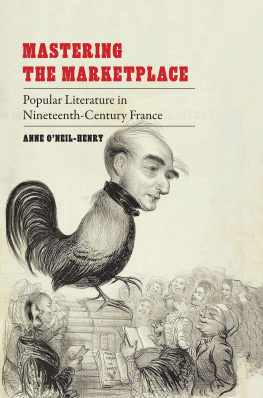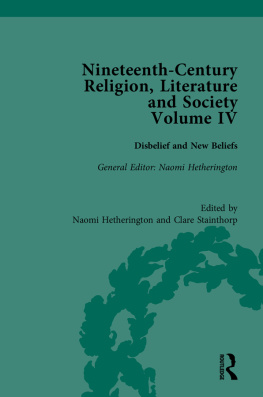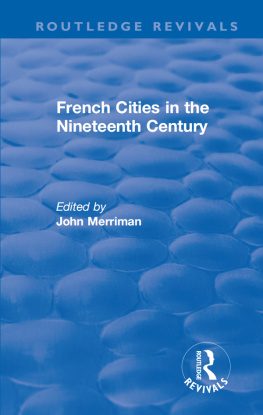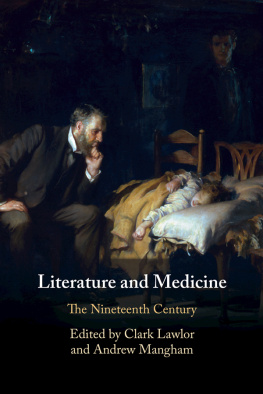ONeil-Henry - Mastering the marketplace popular literature in nineteenth-century France
Here you can read online ONeil-Henry - Mastering the marketplace popular literature in nineteenth-century France full text of the book (entire story) in english for free. Download pdf and epub, get meaning, cover and reviews about this ebook. City: Lincoln;London, year: 2017, publisher: University of Nebraska Press, genre: Romance novel. Description of the work, (preface) as well as reviews are available. Best literature library LitArk.com created for fans of good reading and offers a wide selection of genres:
Romance novel
Science fiction
Adventure
Detective
Science
History
Home and family
Prose
Art
Politics
Computer
Non-fiction
Religion
Business
Children
Humor
Choose a favorite category and find really read worthwhile books. Enjoy immersion in the world of imagination, feel the emotions of the characters or learn something new for yourself, make an fascinating discovery.
- Book:Mastering the marketplace popular literature in nineteenth-century France
- Author:
- Publisher:University of Nebraska Press
- Genre:
- Year:2017
- City:Lincoln;London
- Rating:5 / 5
- Favourites:Add to favourites
- Your mark:
- 100
- 1
- 2
- 3
- 4
- 5
Mastering the marketplace popular literature in nineteenth-century France: summary, description and annotation
We offer to read an annotation, description, summary or preface (depends on what the author of the book "Mastering the marketplace popular literature in nineteenth-century France" wrote himself). If you haven't found the necessary information about the book — write in the comments, we will try to find it.
ONeil-Henry: author's other books
Who wrote Mastering the marketplace popular literature in nineteenth-century France? Find out the surname, the name of the author of the book and a list of all author's works by series.
Mastering the marketplace popular literature in nineteenth-century France — read online for free the complete book (whole text) full work
Below is the text of the book, divided by pages. System saving the place of the last page read, allows you to conveniently read the book "Mastering the marketplace popular literature in nineteenth-century France" online for free, without having to search again every time where you left off. Put a bookmark, and you can go to the page where you finished reading at any time.
Font size:
Interval:
Bookmark:
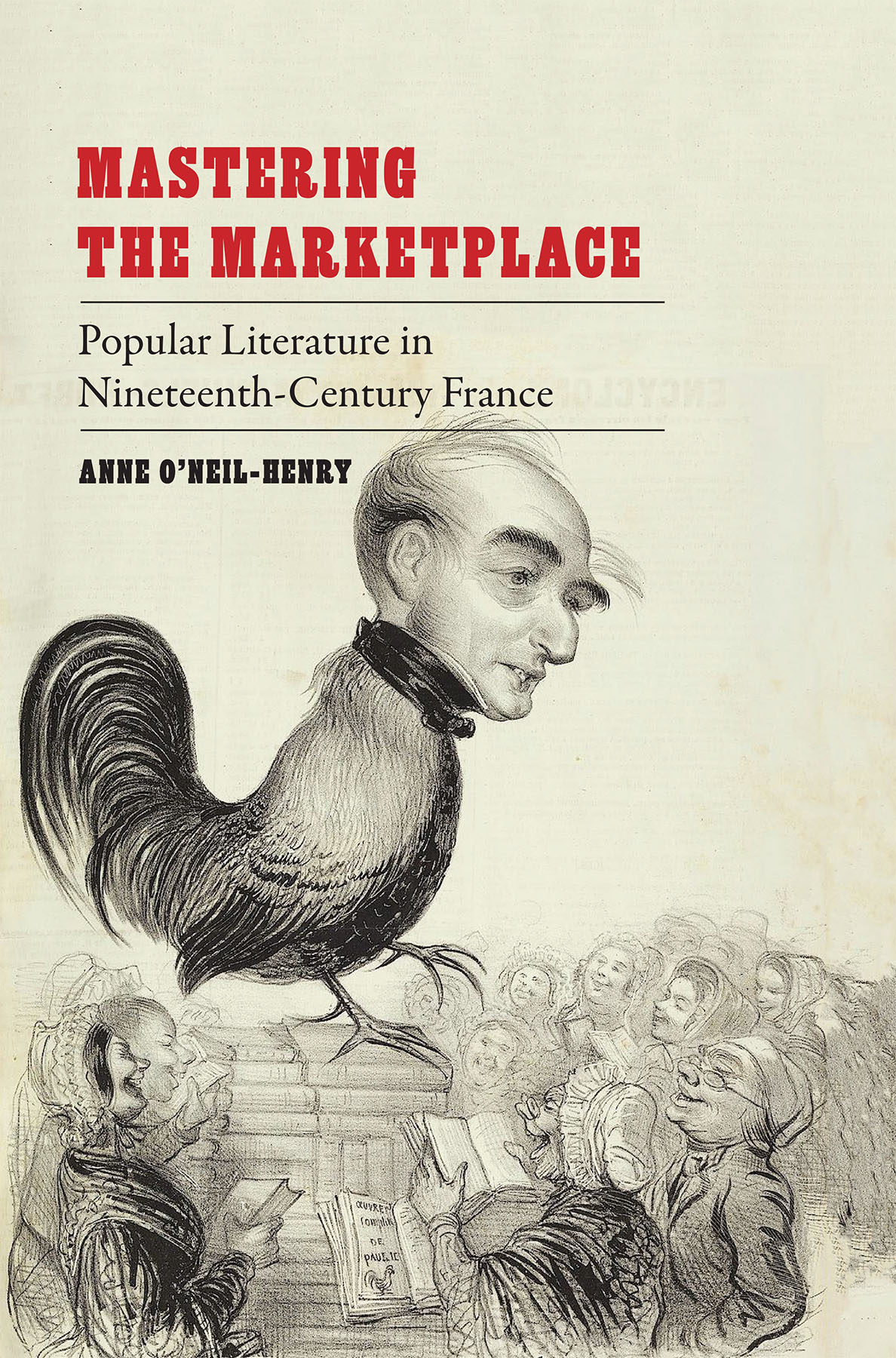
A model of interdisciplinary research, presented with gratifying clarity. Mastering the Marketplace makes original contributions to the cultural study of early to midnineteenth-century France on a number of fronts.
Andrea Goulet, professor of French at the University of Pennsylvania and author of Legacies of the Rue Morgue: Science, Space, and Crime Fiction in France
Unique in the way that it examines the paradoxes of what we now consider low and high literature against a social framework remarkably like our own.... Eminently readable.
Elizabeth Emery, professor of French at Montclair State University and author of Photojournalism and the Origins of the French Writer House Museum (18811914): Privacy, Publicity, and Personality
Anne ONeil-Henry
University of Nebraska Press | Lincoln and London
2017 by the Board of Regents of the University of Nebraska
Acknowledgments for the use of copyrighted material appear in Source Acknowledgments, which constitutes an extension of the copyright page.
Cover designed by University of Nebraska Press; cover art: Portrait of Paul de Kock by Benjamin Roubaud, from the Pantheon Charivarique.
All rights reserved
Library of Congress Cataloging-in-Publication Data
Names: ONeil-Henry, Anne, author.
Title: Mastering the marketplace: popular literature in nineteenth-century France / Anne ONeil-Henry.
Description: Lincoln: University of Nebraska Press, 2017. | Includes bibliographical references and index.
Identifiers: LCCN 2017025011 (print)
LCCN 2017034830 (ebook)
ISBN 9781496204653 (epub)
ISBN 9781496204660 (mobi)
ISBN 9781496204677 (pdf)
ISBN 9781496201980 (cloth: alk. paper)
Subjects: LCSH : French fiction19th centuryHistory and criticism. | Literature publishingFranceHistory19th century.
Classification: LCC PQ 653 (ebook) | LCC PQ 653 . O 54 2017 (print) | DDC 840.9/007dc23
LC record available at https://lccn.loc.gov/2017025011
The publisher does not have any control over and does not assume any responsibility for author or third-party websites or their content.
To Nathan, June, and Irene
I feel fortunate to have received so much supportprofessional and personalfrom many people over the course of this project. I would first like to thank my professors and mentors in the Romance Studies Department at Duke University. In particular, David Bell provided wonderful mentorship in all areas of the profession, and I am so glad to have worked with him. Thanks too to Deborah Jenson, Stephanie Sieburth, and Neil McWilliam, who gave me invaluable advice and guidance. I want to thank Helen Solterer and Linda Orr, who pushed me to think in challenging and creative ways. I am sincerely grateful for the encouragement and friendship of all my Duke graduate school colleagues.
Since my arrival in the Department of French and Francophone Studies at Georgetown University, I have felt welcomed and supported, and I am grateful to all of my colleagues for their help. Special thanks go to Sylvie Durmelat, Susanna Lee, Milna Santoro, Susan Terrio, and Paul Young for their feedback on my work and their support and friendship. I am especially indebted to Andrew Sobanet and Deborah Lesko Baker; they have helped me immeasurably in matters both personal and professional. Outside of my department I am grateful for my other Georgetown colleagues: Daniel Shore and Brian Hochman for their support and friendship, and Ashley Cohen and Nicole Rizzuto for reading portions of this book. We have a wonderful community of scholars in the DC area with whom I have had the pleasure of trading work. Lisa Leff, Elise Lipkovitz, Katrin Schultheiss, Urvashi Chakravarty, and Lindsay DiCuirci all read and gave important feedback on portions of this book. I want to extend very special thanks to Masha Belenky, Kathryn Kleppinger, Chelsea Stieber, and Erin Twohig for their attentive and patient readings of multiple parts of this project and for their collaboration and friendship.
This book is the product of research trips and archival work that would not have been possible without material support from the Department of French and Francophone Studies at Georgetown, the Graduate School of Georgetown, and the Faculty of Languages and Linguistics at Georgetown, for which I am thankful. I am thankful too for the help of research librarians at the Bibliothque Nationale de France, the Library of Congress, Harvard Universitys Houghton Library, and the McGill University Library. Rebecca Saltzman, my student research assistant, was invaluable in helping with translations and bibliographical work; Joan Matus was incredible in her administrative support. I thank Alisa Plant, Courtney Ochsner, and Elizabeth Zaleski at the University of Nebraska Press for shepherding me through the publication process, and Judith Hoover for her attentive reading. I am thankful as well for the two readers of my book, who offered important and much-welcome feedback. Reworked portions of chapters appeared as articles in French Forum and Dix-Neuf, and I am grateful to both journals for their permission for the work to appear here.
A few more personal thanks are in order. First and foremost to my wonderful parents, Patrick Henry and Mary Anne ONeil, for their immeasurable support of my education and for all their professional and personal advice, and to my late grandmother Cornelia ONeil, the best role model imaginable. Thanks to my Hensley and Solomon in-laws for their love and support throughout this project; to Rachel Winkelman for being my expert consultant on all matters related to business, to Elinor Hutton for her brilliant design advice, and to Rebecca Corvino for her copyediting genius and encouragement. Finally, I could not have completed this project without the support of Nathan Hensley, who has been beside me since before this project began and who is the most patient editor, insightful colleague, and thoughtful friend imaginable. June and Irene Hensley make our lives full and lovely, and this book is dedicated to them.
In 1851, while in the midst of composing Madame Bovary, Gustave Flaubert noted that he was experiencing difficulties in his writing and worried he might tomber dans le Paul de Kock. By using Sues name to signify excessively violent description, Balzac evinced his familiarity with but also his contempt for Sues work.
These examples from Balzacs and Flauberts correspondence reveal the overlapping and often interconnected nature of the burgeoning literary marketplace of early to mid-nineteenth-century France. Now-canonical authors and mass cultural impresarios collaborated with, borrowed from, and positioned themselves against one another in the particularly dynamic literary environment of this period, a battleground of cultural and economic value productively viewed as the birthplace of our own modern mass-media culture. This was a cultural field in the process of undergoing radical changes due to a rise in literacy rates, the proliferation of lending libraries and reading rooms, the explosion of literary journals and political newspapers, the rise of the figure of the publisher, the development of advertising techniques in the press, and the advent of the serial novel, among other factors. At this time authors faced the challenge of developing sophisticated tactics for selling their books, working with the new figure of the publisher, and situating themselves within what the sociologist Pierre Bourdieu has theorized as the literary field. In this postrevolutionary period, itself one of great social and political upheaval, the author became, more and more, a professional who wrote for a living and had to negotiate the delicate balance between aesthetic concerns and popular tastes. These commercial demands effectively changed how authors wrote about and altered their conceptions of literary practice. For authors and their critics, in other words, this nascent marketplace generated opportunities for aesthetic and generic innovation as well as demands to meet rapidly changing preferences. My study demonstrates how the material, commercial, and cultural pressures of this new media environment manifested not just in the correspondence or explicit statements of authors, critics, and publishers but in the form of the literary texts themselves. In tracking how these material changes shaped the literary artifacts of this early media environment, we gain access to a more nuanced picture of literary practice during this key period, one that challenges the still powerful categories of high and low literature. What we see, ultimately, is a world in which Flaubert and de Kock, Balzac and Sue, were not opposite figures so much as rival players on the same stage.
Font size:
Interval:
Bookmark:
Similar books «Mastering the marketplace popular literature in nineteenth-century France»
Look at similar books to Mastering the marketplace popular literature in nineteenth-century France. We have selected literature similar in name and meaning in the hope of providing readers with more options to find new, interesting, not yet read works.
Discussion, reviews of the book Mastering the marketplace popular literature in nineteenth-century France and just readers' own opinions. Leave your comments, write what you think about the work, its meaning or the main characters. Specify what exactly you liked and what you didn't like, and why you think so.

